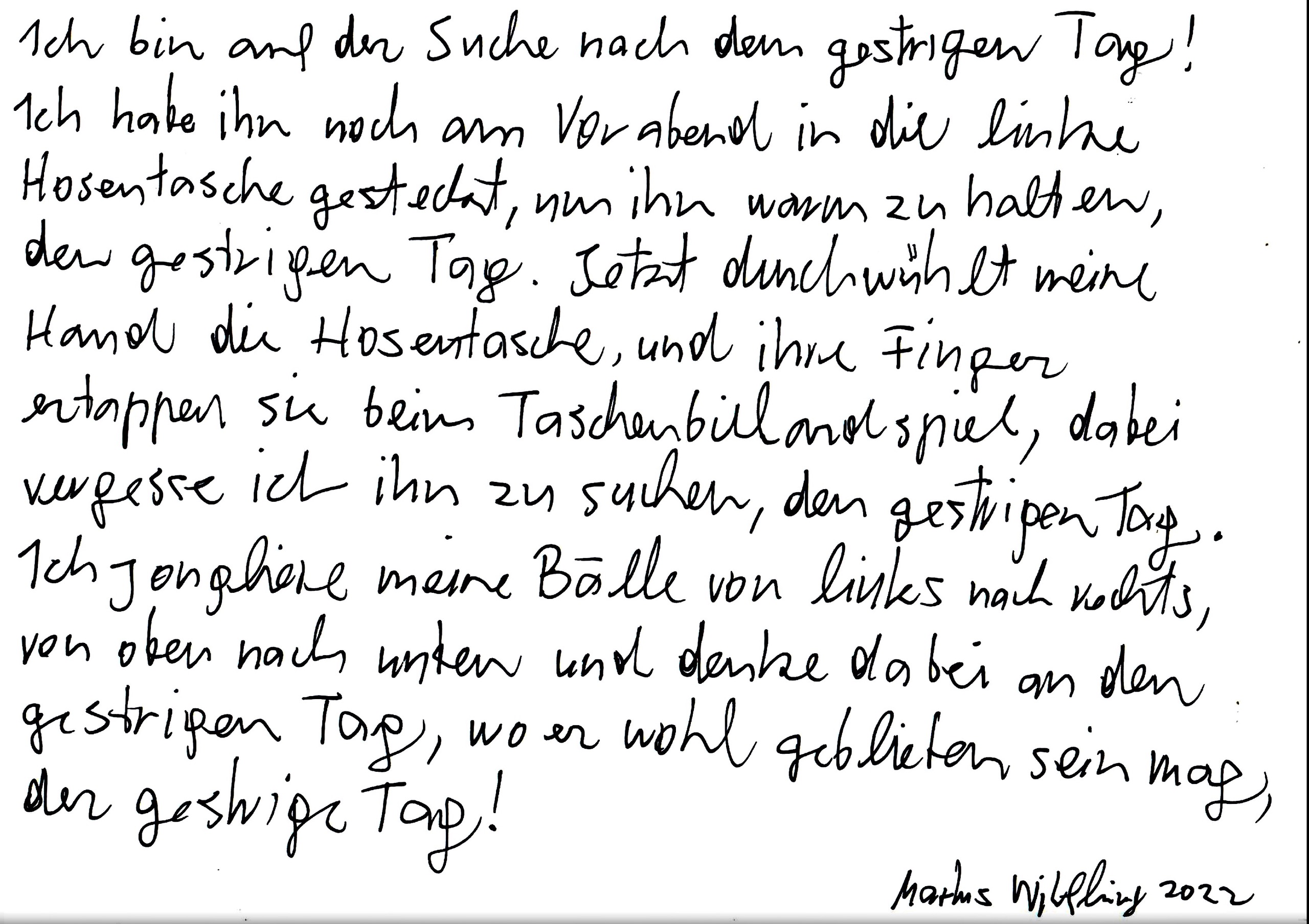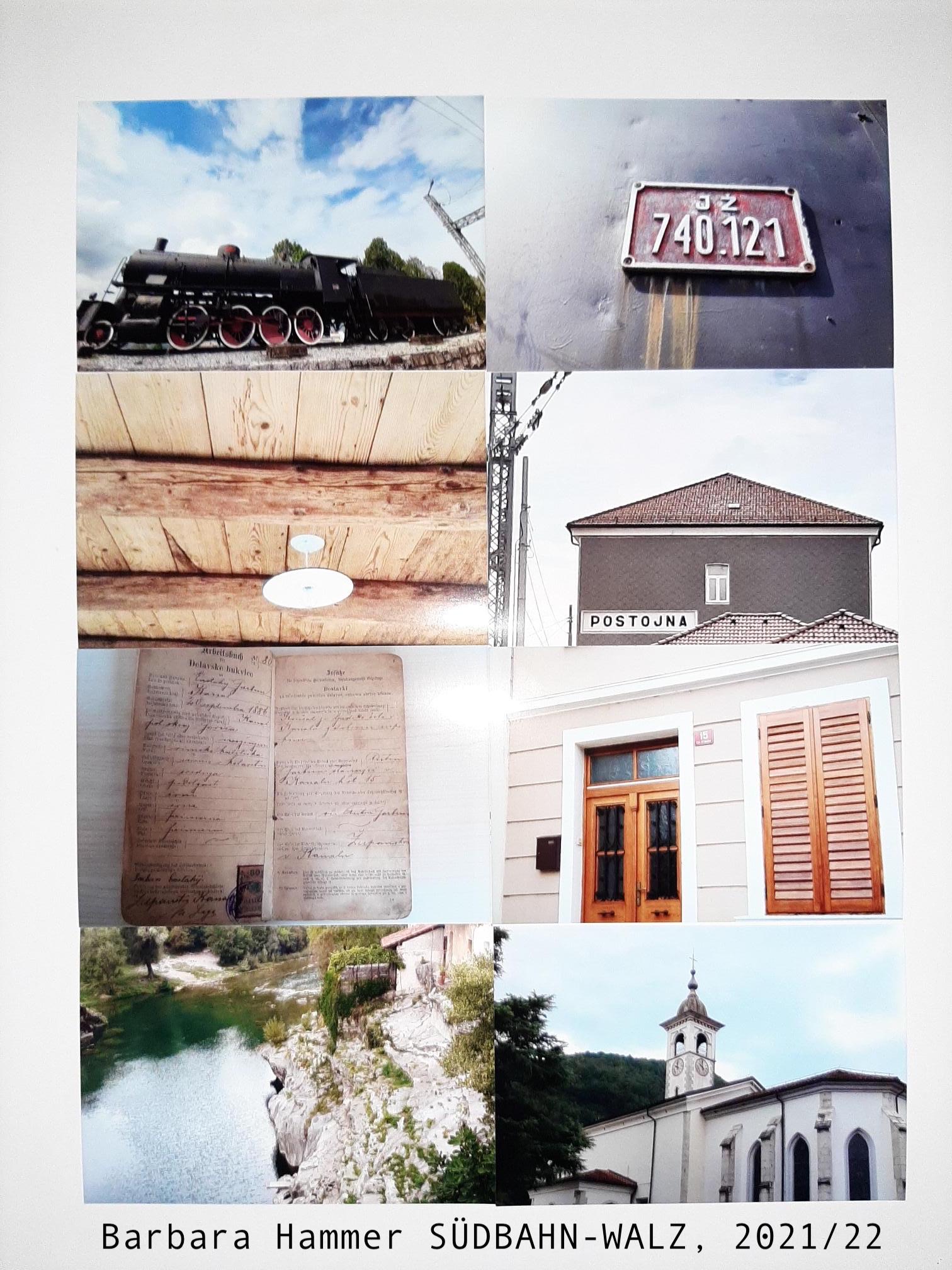Barbara Hammer, Aus der Serie SÜDBAHN, Holzschnitt/woodcut 2022
Works by Barbara Hammer,┬ĀLore Heuermann,┬ĀMarkus Wilfling┬Ā& Cy Twombly ┬Āin the kunstGarten ┬Ā&┬Āin the Street Gallery.
Curator: Irmi Horn
The exhibition will be opened by the Town Councillor Dr G├╝nter Riegler and art historian Elisabeth Zuparic, BA.
The exhibition will be opened by Councillor Dr G├╝nter Riegler and art historian Elisabeth Zuparic, BA.
Someone can be in search of something lost, but also in search of something to be discovered.
Some people will find the search tiresome and exhausting, others exciting, challenging and exhilarating.
How people find their path in life can be determined by the socio-political structures of their background and yet also depend on personal commitment.
Curiosity and thirst for knowledge, adaptation to changing living conditions, change of place, migration and thus communicated experiences have given rise to human civilisation and culture.
Until the First World War, many people were still on the “Walz” (tippelei, journeymen’s migration). From the 16th century onwards, wandering was even a duty for many journeymen.
The wanderings and the experience gained were therefore prerequisites for becoming a master craftsman. In the present day, this “experienced” mastery is built up in apprenticeships as well as in studies rather through “scholastic” practice. The closeness and habitability of the world in virtual networks remains like a synthetic gemstone without the naturally experienced origin in the earth history of the universe an evolutionary transgression.
In this country we enjoy a democratic constitutional state and there are many opportunities for seeking & finding.
Some explore the world by walking, driving or flying, others use literature, the internet … study, work scientifically, try to create and defuse problem situations, look for conflicts and their possible solutions, look for peace, look for exhilaration, look for freedom, look for home. Some are comfortable, content and do not want to know more than tradition dictates or even allows them.
Women in Afghanistan would like to know something. But they are not allowed to go to school. Eve’s thirst for knowledge already led to the expulsion of people from paradise!
Some want to know exactly, some are satisfied with elaborate world function stories and abstruse conspiracy theories, want to find and condemn the guilty.
But there are also other seekers: Those from war zones, areas of tyranny and drought regions who are struggling for bare survival: immigrants in search of a dignified home.
Artists take different approaches and perspectives.
Barbara Hammer, for example, has embarked on a search for traces of the past and, in woodcuts and photo collages, relates past reality to the current reality of travel: travel as a search for knowledge, experience, work and a longing for faraway places in previous centuries is often in stark contrast to travel today: Pleasure, relaxation, pleasure gain or business expansion.

Barbara Hammer, Aus der Serie SÜDBAHN, Holzschnitt/woodcut 2022
Lore Heuermann (- the power woman turns 85 this year) and Cy Twombly share a kind of scriptural painting that indicates that much in this world has not yet been grasped: Both create signs in precise and powerful movement, with which they construct aesthetic images whose gestures allow for mysteriously expansive emotional experiences of searching and finding.

Lore Heuermann BODIES, Japanische Tusche auf Nepalb├╝tten 2016
Heuermann starts from the movement of the human being, from his posture, his expression, creates the demand of looking at and perceiving our counterpart, the human being in his physicality, which is characterised by his health, willpower, emotion, empathy or a broken resistance, resignation.
Twombly, a student of the American expressionist Franz Kline and the painter and writer Robert Motherwell, was drawn to the European south, to the Old World and its mythological structures, where he could meditate on the spot on the Mediterranean light and use motifs and conditions of nature to allude to the joy and transience of life and its ambivalences.

Cy Twombly (1928-2011), Untitled (Bacchus), 2005. 128 x 194┬Į in (325.1 x 494 cm)
Markus Wilfling, who studied with Bruno Gironcoli at the Academy of Fine Arts and has distinguished himself in playing on specific places or spaces, presents an installation that reflects the perceptual process of searching and finding, finding the real and the fictitious, the perceived and the imagined, and opens up a discourse on this.
He also exhibits a poem that is dedicated to the experienced but lost day and seeks to find its essence.

Markus Wilfling GEDICHT/Poem, 2022
Even if there is a certain redundancy in searching and finding, every moment is a unique, new one, even a d├®j├Ā vu!
She shows a series of woodcuts SÜDBAHN:
A rolling book from the time of the monarchy inspired me to create the woodcut series
SOUTHWAY. The search for work led Evstahij Garbun, born in 1886 in the village of Kanal
in the Isonzo Valley (today Kanal ob So─Źi in Slovenia) to Trieste and then out into the wide world of the
the wide world of the monarchy, until he finally spent his retirement in Styria.

Barbara Hammer SÜDBAHN-WALZ, 2021/22
Since the 19th century, travel routes in the opposite direction have brought Austrians to their place of longing, Trieste, via the southern railway. And so the
the search for traces also led me from Graz via Vienna, Bruck a.M., Maribor, Lubljana
and Postojna to Trieste by the sea.
The series of woodcuts refers to this search for traces, poses the question “is the way the goal?
the goal” and reflects the search for a destination on the long journey. The abstract design of the prints refers to this mostly mountainous route, which is linked to the history of the
the history of the Austrians and their longing for the sea.
Barbara Hammer was born in Graz, where she still lives and works as an artist.
She has been intensively involved in painting and printmaking since 1986 and has constantly sought further training, for example in Berlin and Dresden in the context of summer academies as well as in the Dresden Graphic Workshop (Technical Collection).
In her art, Barbara Hammer deals intensively with contemporary events and takes a stand on threats and injustice. The deficits in dealing with human rights are currently the focus of her works. Her most recent etchings are contemporary socio-political statements.
She has already presented her works in numerous exhibitions at home and abroad.
She is a member of the Professional Association of Fine Artists of Austria and the International Association of Woodcutters XYLON, Section Austria.
Markus Wilfling will create something special.Wilfling, who studied with Bruno Gironcoli at the Academy of Fine Arts, is an extremely distinguished Austrian artist in playing on specific places or spaces. He transforms everyday objects and materials into often monumental art objects and installations and develops his very own formal language in sculpture .Markus Wilfling (1966, Innbruck, Austria) is a sculptor and teaches at the Ortweinschule Graz. Numerous exhibitions since have established him as an important Austrian artist. He lives and works in Styria.
Lore Heuermann (- the power woman turns 85 this year) & Cy Twombly are united by a kind of scriptural painting that points out that much in this world has not yet been grasped: They create signs in delicacy and sweeping gestures, with which they construct aesthetic typefaces whose gestures, mysteriously expansive, allow emotional experiences of searching and finding.
Born in M├╝nster, Lore Heuermann came to Vienna in 1956. In 1957/58 she studied at the Academy of Fine Arts in Vienna and in 1958 at the Acad├®mie de la Grande Chaumi├©re in Paris. In the 1960s she made study trips to Greece, Turkey, Syria, Jordan, Lebanon and Egypt, and in 1978 to Sicily and Lampedusa in Italy. Since the early 1980s, she has travelled to countries on almost every continent, including a work and study stay with Harvey Littleton (see studio glass movement) in North Carolina (USA) in 1984 and a six-month scholarship in Fujino (Japan) in 1997/98, as well as on the occasion of exhibitions and performances.
She is a member of the Grazer Autorinnen Autorenversammlung (GAV) and since 2000 of the IG Bildende Kunst in Vienna. In 2005, she was curator of the exhibition Frauen machen Druck at the Galerie im Sitzungssaal in Vienna.
Lore Heuermann was married to the writer and former Berlin innkeeper Oswald Wiener (1935-2021), from whom she has been divorced since 1964. Together they have two daughters and a son, including the television chef and entrepreneur Sarah Wiener (* 1962). ┬ĀHeuermann has lived and worked in Vienna since the 1950s.
Born Edwin “Cy”Parker Twombly Jr.,┬ĀApril 25, 1928┬ĀLexington, Virginia, U.S.,┬ĀDied July 5, 2011 (aged 83)┬ĀRome, Italy
Education:
School of the Museum of Fine Arts, Boston
Washington and Lee University
Art Students League of New York
Black Mountain College
Darlington School
Known for Painting, sculpture, calligraphy
Awards Praemium Imperiale, Legion of Honor
Edwin Parker “Cy” Twombly Jr. (/sa╔¬ ╦łtw╔Æmbli/; April 25, 1928 ŌĆō July 5, 2011) was an American painter, sculptor and photographer. He belonged to the generation of Robert Rauschenberg and Jasper Johns.
Twombly is said to have influenced younger artists such as Anselm Kiefer, Francesco Clemente, and Julian Schnabel. ┬ĀHis best-known works are typically large-scale, freely-scribbled, calligraphic and graffiti-like works on solid fields of mostly gray, tan, or off-white colors. His later paintings and works on paper shifted toward “romantic symbolism”, and their titles can be interpreted visually through shapes and forms and words. Twombly often quoted poets such as St├®phane Mallarm├®, Rainer Maria Rilke and John Keats, as well as classical myths and allegories, in his works. Examples of this are his Apollo and The Artist and a series of eight drawings consisting solely of inscriptions of the word “VIRGIL”.
Twombly’s works are in the permanent collections of modern art museums globally, including the Menil Collection in Houston, the Tate Modern in London, New York’s Museum of Modern Art and Munich’s Museum Brandhorst. He was commissioned for a ceiling at the Mus├®e du Louvre in Paris.
In a 1994 retrospective, curator Kirk Varnedoe described Twombly’s work as “influential among artists, discomfiting to many critics and truculently difficult not just for a broad public, but for sophisticated initiates of postwar art as well.”
